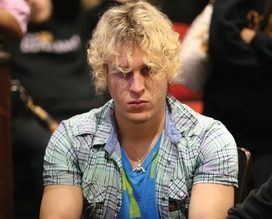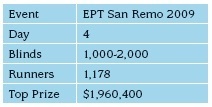






Hand 2 Hand Combat -- William ReynoldsReynolds Breaks Down A Key Hand From His Deep Run at EPT San Remo |
|
|
 Although it was Constant Rijkenberg who went on to claim the top prize at EPT San Remo, William Reynolds finished fourth for a nice payday of $490,100. In taking down his first major live score, Reynolds caught the eye of the live international poker scene.
Although it was Constant Rijkenberg who went on to claim the top prize at EPT San Remo, William Reynolds finished fourth for a nice payday of $490,100. In taking down his first major live score, Reynolds caught the eye of the live international poker scene.
Taking his skills from the virtual world to the live became quite a habit following this, which resulted in Reynolds scoring a touchdown at the PokerStars Caribbean Adventure High Roller in 2010 where he received $576,240 for topping a stellar field.
More big paydays would follow both in the live and online poker world and, at the time of writing, the Iowa-born 23-year-old has more than $2.3 million to his name.

Rebecca McAdam: Can you tell me a little bit about your mindset going into this event?
William Reynolds: This was only my fourth major tournament and the first time in the money. While on break with a few friends we briefly discussed how important it is to play these EPT tournaments for the win.
William Reynolds raises to 4,700 from middle position with K-9. It is folded to the player in the big blind who calls.
Flop: A K
K 3
3
WR: This is a very dry flop that misses the majority of the big blind’s defending range. I have a hand that almost never gets called by worse so checking back for pot control/bluff catching seemed like the most obvious answer to my hand. However, I thought to myself if I were to check back it could possibly be more costly to myself because I had established versus this opponent I’m never folding to turn and river bets, and I’d be giving my opponent the opportunity to control the pot with large, near pot-sized bets if he had an ace. With this line of logic controlling the pot with a flop bet and checking behind the turn to get to the river seemed like the best/cheapest line to get to showdown. My intuition was if I bet the flop and he called, I was prepared to check back the turn and fold to any river leads expecting him only to bet an ace.
Now after all of that I had to pick my bet size — due to the board texture and the high percentage of my opponent check-folding, a small bet was in store. In fact, smaller than my preflop raise size; 3,200 was the magic number, any bigger and I’m just inflating the pot for no reason when I can get away with winning the chips in the middle for next to the bare minimum. My opponent, a middle-aged Italian man, thought for a moment and tossed chips forward, chips that did not add up to 3,200; they were check-raising chips.
Villain checks. Reynolds bets 3,200. Villain raises it to 11,500.
WR: My entire plan for the hand had just been destroyed. I began to reanalyze the situation.
RM: What did you come up with?
WR: My head was spinning and eventually stopped on. My opponent was probably reading me for weakness since I made an absurdly small wager on the flop. I was under the impression he would just call if he had an A or K, that leaves Q-J, Q-10, J-10 as bluffs with equity, a small possibility of A-3 or 3-3 for stacked value hands, and his random cards that are trying to stone bluff their way to a win. With more bluffs than value in this range, I concluded a call was in store. There is 36,100 in the pot.
Turn: 7
WR: The 7 completes the rainbow, My opponent thought for a moment and tapped his finger on the felt indicating a check. This was a fantastic sign for me, I now regained command of the hand, My options — check or bet…
completes the rainbow, My opponent thought for a moment and tapped his finger on the felt indicating a check. This was a fantastic sign for me, I now regained command of the hand, My options — check or bet…
Checking allows me to get to showdown with presumably the winning hand — I felt strong about my opponent’s best possible hand being one pair at most with the vast majority of his hands being airballs at this point. I concluded I did not want to give my opponent the chance at a free card that could potentially give him two pair/trips/or a straight so I bet.
RM: What was the magic number this time?
WR: Again I did not need to bet large as the majority of hands I was putting him on
could not call. Magic number: 10,800.
Villain checks, Reynolds bets 10,800. Villain thinks for 30 seconds and makes the call. Pot: 57,700.
River: 2
WR: My opponent checked while never taking his eyes off of me. Time to reevaluate the situation. He check-raised a small flop bet and then check-called a small turn bet. At this point I was 100 percent certain he had check-raised the flop with a bad ace — often inexperienced players will make a “feeler” raise to find out how I react, I reacted by calling which indicated I had a made hand, he checked the turn and I again bet an amount that was screaming I am not afraid of you to call, it was a very inviting wager which he accepted; My opponent wasn’t the caliber of player who could even begin to comprehend what turning a pair into a bluff was all about. I began to think all of the pieces of the puzzle should add up in my opponent’s eyes for him to put me on A-Q or better… time to win the pot. I announced “all in” for 44,800 — my opponent began squirming in his seat, clearly unpleased with the way the hand had played. I began spinning in my head realizing my entire tournament life was on the line. The Italian amuteaur was in the tank for over five minutes before someone at the table called clock. The tournament director came over and began counting down the 60 seconds. With every second that passed the tension mounted. At the 12-second mark my opponent flashed an ace while mucking his cards. I immediately flipped over the 9 and left him wondering if I was sick enough to be taking A-9 all the way or stone cold bluffing. I scooped the pot and proceeded to watch that guy tilt his way out of the tournament over the next two orbits while I went on to get fourth place.
RM: Moral of the story?
WR: If you can represent a bigger hand than your opponent’s you need to do what you have to do to win the pot and set yourself up to play for the win! If I didn’t shove the river I would have just over 20 big blinds which eliminates any wiggle room. If I shove and win I accumulate chips that give me enough space to breathe.
RM: Very nicely done! Any more thoughts?
WR: Once I make such a small flop bet, it often induces a bluff raise. I have to call with almost my entire range since I gave him the opportunity to pop it up. After he checks the turn, this generally means he’s giving up on the hand so a small bet to win the pot works well when the current chips in the middle represent such a large percentage of my stack. However, after he check-calls my turn bet it’s evident he has a made hand because this player didn’t know what floating out of position could possibly mean. Once the river hits a deuce it’s clear I have to get him off of Ax by moving it all in.
If I hadn’t played that hand I may have never put myself into a position to win almost 500k. ♠
